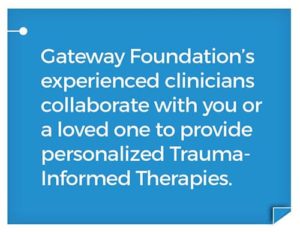- Jul 10
- AddictionAddiction TherapyDual Diagnosis TreatmentMental Health TreatmentTreatment
There’s a strong correlation between trauma and addiction. Learn why you or a loved one should immediately seek help for both issues to experience dual recovery.
What is Trauma?
Trauma can occur following any highly stressful or life-threatening event. Traumatic events can fall into several categories including, natural disasters like earthquakes or hurricanes, man-made catastrophes like school shootings, or calamities like motor vehicle accidents, loss of residence due to fire or death of a loved one.
Post-Traumatic Stress Disorder (PTSD) may develop if you:
- Experienced a traumatic event
- Witnessed the event as it occurred to somebody else
- Learned about an event where somebody close to you experienced a traumatic event
- Became repeatedly exposed to distressing details of events, such as police, fire or military members
Symptoms include:
- Reoccurring, intrusive upsetting memories of the traumatic event
- Repeated upsetting dreams
- Flashbacks
- Strong and persistent distress upon exposure to cues
- Loss of interest in activities you once enjoyed
- Inability to experience positive emotions
- Irritability
- Feeling constantly “on guard” or hyper-vigilant
- Heightened startle response
- Difficulty concentrating
- Difficulty with sleep including trouble falling asleep or staying asleep
What is Addiction?
Research shows that addiction is a disease, not a simple choice to use or not use substances. It affects the brain in many ways, resulting in involuntary cravings and reliance on drugs or alcohol.
Most drugs target the reward center of the brain. When someone uses a drug, the neurotransmitter dopamine is released and floods the brain, signaling feelings of pleasure. When an action increases dopamine levels, the person is motivated to repeat that action – in this case, to use the drug again. Then, compulsive cravings occur, which can lead to the development of a substance use disorder.
What is the Relationship Between Trauma and Addiction?

Gateway’s Dual Recovery Approach to Treating Trauma and Addiction
At times, trauma can be a block to recovery, which is why trauma needs to be considered in both the treatment and recovery process. Gateway’s experienced addiction counselors, psychologists, psychiatrists, doctors, nurses, family therapists and social workers will collaborate with you or a loved one to provide personalized, Trauma-Informed Addiction Therapies. Our Dual Diagnosis Treatment Centers address co-occurring trauma and substance use disorders.
In addition to Outpatient Treatment programs, certain Gateway centers offer gender-specific Residential Treatment programs to address specific recovery needs.
Once treatment is complete, Gateway extends support for lifelong recovery, which is why a continuing care plan is part of every person’s treatment experience. In addition, ongoing recovery support and fellowship is offered post-treatment through alumni and Recovery Community programs.
Although they can be troubling issues, trauma and addiction don’t have to define the rest of you or your loved one’s life. Call Gateway now at 877.505.4673 to learn how our addiction treatment programs in Illinois can lead to dual recovery.


